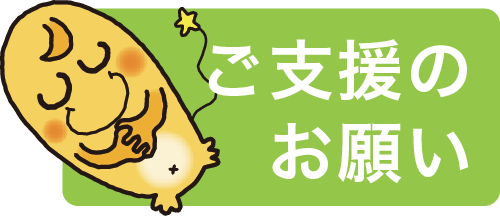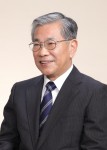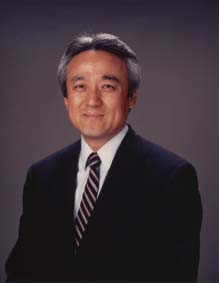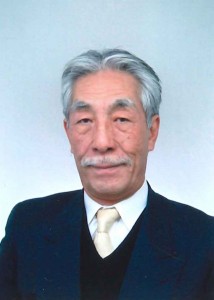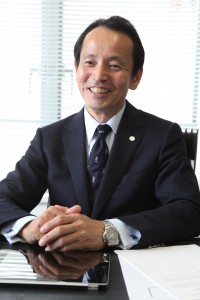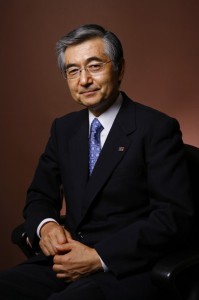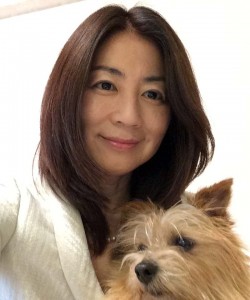|
|
||||||||||||||||
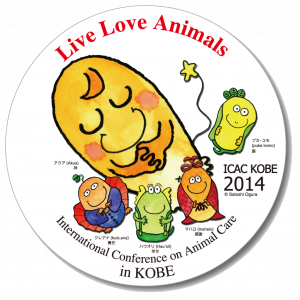
—Profile—
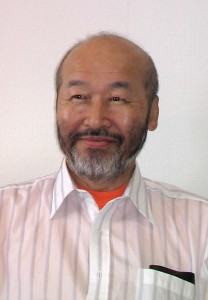 |
Takashi UEMURA
Takashi UEMURA was born in Osaka in 1940 and graduated from the Department of Veterinary Science, School of Agriculture, Osaka Prefecture University in 1963. He then read Veterinary Microbiology at Post-Graduate school after which he worked as an Assistant Professor in a Veterinary Public Health Laboratory. Later he became a lecturer, Associate Professor then Professor until his retirement. During that time, he was Visiting Researcher at the University of California Davis and also at the Norwegian Food Research Laboratories. Past Academic Activities include: Present Academic Activities: Social Activities include: Awards & Recognition include: |
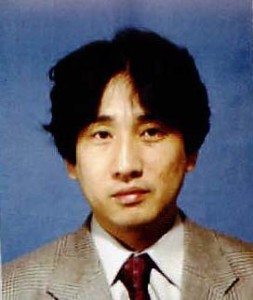 |
Kazumi SASAI
Educational and Professional Background:
1993-1994: Visiting scientist, US Department of Agriculture Research Center, Beltsville, U.S.A.
1999: Visiting scientist, Malaysia Department of Agriculture Research Center, Ipoh, Malaysia.
2001: Associate Professor, Graduate School of Life, Environment, and Advanced Sciences, OPU. 2009: Professor, Graduate School of Life, Environment, and Advanced Sciences, OPU.
Members of Academic Societies: |
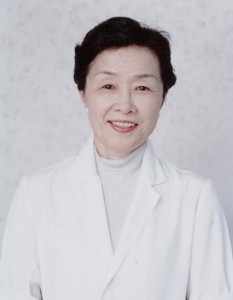 |
Hiroko SHIBANAI
Member, Animal Care Department of the Animal Welfare Committee for Proper Management Measures, Japan Animal Welfare Society (JAWS)
While Dr. Shibanai was working with companion animals in the veterinary field for many years and, as fourth JAHA President, she started up the ‘Companion Animal Partnership Program’ (CAPP). She has worked tirelessly in the practice and promotion of Animal Assisted Activity, Therapy and Education and delivers lectures on a regular basis.
Posts and Activities-
Prizes / Awards-
Publications: |
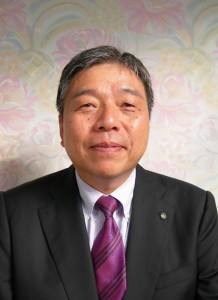 |
Kimihiro TAMAI
Dr. Tamai was born in 1955 in Wakayama Prefecture, Japan.
In 1978 he graduated from the Department of Veterinary Science, Faculty of Agriculture, Osaka Prefecture University before joining Fujiidera Animal Hospital working under its Director, Dr. Tetsuyo Koreeda. In 1981, Dr. Tamai founded Kinokawa Animal Hospital and, while providing veterinary services to the local community, became Chairperson of the Wakayama Veterinary Medical Association in 1999. This is a post he continues to hold today, and the association became a Public Interest Incorporated Association (PIIA) in 2012. Since 2001 he has also been Supervisor of the Japan Veterinary Medical Association (which also became a PIIA in 2012) and Deputy Chairperson of Wakayama Prefecture Animal Care Promotion Committee, etc.
Dr. Tamai holds, and has held, several other posts in his career such as Board Director of the Japanese Animal Hospital Association, Board Director of Animal Protection and Control Association, Chairperson of the Alliance of Veterinary Medical Associations in Kinki District, Chairperson for the Veterinary Medicine Clinical Study Group of Osaka Prefecture University, membership of the Wakayama Prefecture Study Group for Prevention of Zoonosis, and Deputy Executive Director of Neovets, Inc.
Overall, Dr. Tamai is actively working to contribute to a better coexistence between man and other animals. |
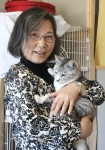 |
Dr. Yamaguchi graduated from the Department of Veterinary Science, Faculty of Agriculture, Osaka Prefecture University in 1975.
Between 1979 and 1981 she studied in the UK and Canada, receiving animal welfare training and qualifying as an Inspector for the RSPCA (Royal Society for the Prevention of Cruelty to Animals). Since 1981 she has been working as a veterinary inspector for the Japan Animal Welfare Society (JAWS).
She is also a member of the Inquiry Committee for Animal Protection and Control in Tokyo Prefecture, a member of the Animal Protection Promotion Committee in Sendai City, and a member of the Animal Protection and Welfare Committee within the Japan Veterinary Medical Association (JVMA). |
 |
Keiko YAMAZAKI
born March 1st 1954.
Publications:
Translations: |
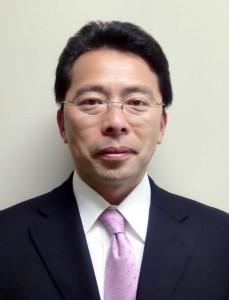 |
Soichi MARUYAMA, Ph D
Born in 1957
Educational and Professional Background
Social Activity
Research Activity |
|
|
|
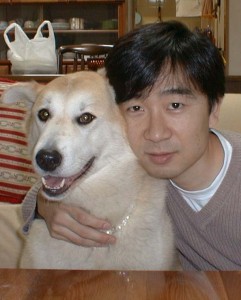 |
Satoru ARAI
After completing his studies at the Graduate School of Rakuno Gakuen University in Hokkaido, where he gained a PhD in Veterinary Medical Science, Satoru Arai joined the Infectious Disease information Center of the National Institute of Infectious Diseases in Tokyo. In 2013, when the organization’s name was changed to the Infectious Disease Surveillance Center, he became an affiliated member. Since his college days, he has continuously worked in the field of infectious diseases and carried out research into protozoa and virus infections. Currently he is working on the detection of unknown viruses carried by rodents and bats in the context of seeking countermeasures for unknown infectious disease. He is also evaluating the effects of vaccination in preventing diseases and studying effective vaccination schedules.
|
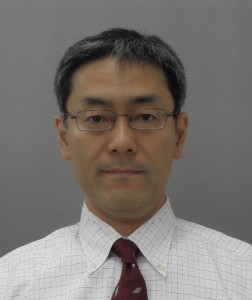 |
Satoshi INOUE, DVM, PhD
1980-1984: Curriculum of Veterinary Medical Sciences at the University of Yamaguchi (Graduate School, Division of Agricultural Sciences) 1984-1986: Master’s Course in the Department of Veterinary Medical and Animal Sciences at the University of Tokyo (Graduate School, Division of Agricultural Sciences) 1986-1989: Doctoral Course (at the same) 1989-1994: Research Officer, Laboratory of Zoonoses (Laboratory of Veterinary Public Health; 1989-1992), Veterinary Science Dept., National Institute of Health of Japan. 1994-1996: Visiting Research Fellow, Tumor Immunology Division, Dana-Farber Cancer Institute, Boston, USA. 1996-1998: Senior Research Office 1998-1998: Research Fellow, Rabies Section, Viral and Rickettsial Zoonoses Branch, Viral and Rickettsial Diseases Division, National Center for Infectious Diseases, Atlanta, USA. 2001–Present: Associate Professor, R-Emerging diseases, Majors Chairs Applied Veterinary Science, United Graduate School of Veterinary Science, Gifu University. 2001: Senior Research Officer, Laboratory for Transmission Control of Zoonoses, Veterinary Science Dept., National Institute of Infectious Disease 2003–Present: Chief (at the same) |
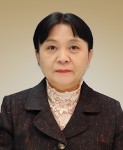 |
Ayako Sano was born in Tokyo in 1958, graduated Faculty of Veterinary Medicine, Azabu University in 1981,and completed the Master Course of Veterinary Medicine Azabu University in 1983. After working at a private company, she has started to research on medical mycology in Chiba University since 1987, and received Ph.D.in 1994. Then, through a research fellow, a foreign researcher in Brazil, an expert in JICA project in Brazil, and a part-time staff, she worked as an associate professor in Chiba University in 2002, and has moved to work at the present place since 2011. Her special field is medical mycology. As researches on zoonotic fungal infections, she is now investigating not only on dermatophytoses and emerging fungal infections but also highly pathogenic fungal ones especially for histoplasmosis and lacaziosis. In addition, she would like to develop the research field of fungal diseases in aquatic mammals, such as dolphin and manatees. |
|
|
|
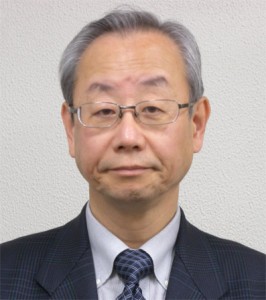 |
Yuzaburo OKU
From when I was a postgraduate student at Hokkaido University (in the Veterinary Parasitology Lab.), then from my time as an associate professor through to my current post at Tottori University (since 2010), I have been researching the various parasitic worms within wild animals and livestock. I have conducted this from a number of angles including; their classification, lifecycle, immune response, pathology, and molecular biology. In the past 20 years or so, I have been focusing in particular on echinococcus (which I will talk about today) and working to develop diagnosis in dogs, and to counter parasites in foxes, at the level of towns and villages. My dream is to eliminate echinococcus from Hokkaido. I myself have moved from Hokkaido to Tottori and become a keen gardener. Tottori has a milder climate than Hokkaido and I can enjoy a great many more varieties of tree and flora. |
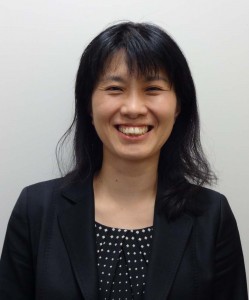 |
Deputy Director, Tuberculosis and Infectious Disease Control Division, Health Service Bureau, Ministry of Health, Labour and Welfare
In 1999 Dr. Fukushima joined Japan’s Ministry of Health, Labour and Welfare (formerly, Ministry of Health and Welfare) as a Veterinary Officer. Within the Department of Food Safety she was involved in safety assessment of genetically modified foods, in drawing up the relevant standards and regulations (according to the Food Sanitation Act), and in negotiating international food standards, etc. In 2009, she was posted to the Department of Food Safety and Zoonoses of the World Health Organization in charge of the microbiological risk assessment of food. Her current post, since May 2012 involves working on measures to counter zoonoses and for the control and regulation of pathogens. |
|
|
|
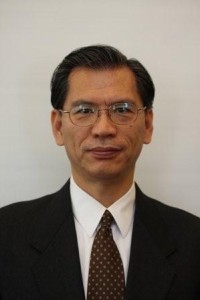 |
Hirohisa TOTSUKA
Hirohisa TOTSUKA is a veterinarian from Suruga Ward, Shizuoka City in Shizuoka Prefecture, Japan. He was born in 1950 (30th October), and graduated, in March 1974, from the Veterinarian Department of Nippon Veterinary and Zootechnical College (now Nippon Veterinary and Life Science University). In May 1979 he opened ‘Daktari Animal Hospital Yaizu’ in Yaizu City, Shizuoka Prefecture. He currently runs three facilities, namely, Yaizu Center Hospital, Oigawa Hospital and Yaizu Otomi Hospital.
Posts : Chair for the Japanese Animal Hospital Association (JAHA) CAPP Committee (current)
Board Member (former) of the Japan Small Animal Veterinary Association (JSAVA) President (former) of the Daktari Animal Hospital Group Awards: August 2008Bustad Award (JAHA welfare services award) September 2009 Japan Animal Protection Management Association Award. |
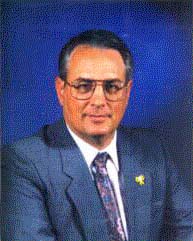 |
Thomas E. Catanzaro, DVM, MHA, LFACHE
Dr Tom Cat (as known by most of the veterinary profession) is well-known for his publications which have altered the veterinary practice management paradigms of this profession over the past 20 years. His first bachelor’s degree (Animal Science, major in genetics) was from Montana State University (1966); he entered the Army from Montana and learned medical administration during three Infantry assignments, including Viet Nam. His DVM is from Colorado State University (1974) and his Master’s in Healthcare Administration is from Baylor University (1985). His 1991 board certification in the American College of Healthcare Executives was a first for a veterinarian; he must recertify every three years. In 1996, he was selected for Fellow; less than 10% of the 30,000-plus members of the American College of Healthcare Executives are bestowed this honor.
With 15 texts, 30-plus monographs, and over 300 periodical and proceeding publications, he has moved the HAB, veterinary practice leadership and team-based healthcare delivery to the forefront of veterinary operational systems. In 2004, the AVMA selected Dr. Catanzaro to roll-out the new wellness surveillance programs for practices, the THINK TWICE FOR LIFE program, and his initial presentation content template was used for the 2005, 2006, 2007 and 2008 presentation upgrades of the AVMA/FDAH program (www.npwm.com). His consulting clients around the world have experienced significant growth, while the traditional doctor-centered practices have been experiencing reduced client contact and decreasing net income. In 2012, the American Veterinary Medical Association awarded Tom the Bustad Companion Animal Veterinarian of the Year, a recognition of his ongoing Human Animal Bond and professional efforts over the past 30 years.
In May 2008, he relocated to Brisbane, QLD, and is making Australia his home base now. In his spare time, he actively supports Boy Scouting programs on the local and National level. He also squeezes in speaking engagements as time allows. Books 14 and 15 have been electronically published by VIN, a first in management or leadership texts, The Practice Success Prescription: Team-based Veterinary Healthcare Delivery (March 2008) and Promoting the Human Animal Bond in Veterinary Practice, 2nd Edition (March 2009); both have been made available for FREE DOWNLOAD from the VIN Library. |
|
|
|
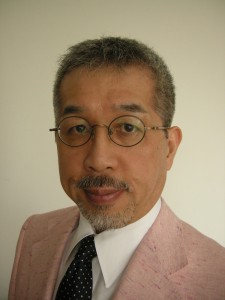 |
Director of Yamaoka Pediatric Allergies Clinic
It has been 7 years since I founded a pediatric clinic for children’s allergy in Kobe City. As a specialist I am authorized by both the Japan Pediatric Society and Japanese Society of Allergology. It was when I was working for Kobe City Medical Center General Hospital that I had the opportunity to take part in the ‘2002, Live Love Animals International Symposium’. I remember how my horizons were broadened. I became a doctor in town to specialize in treating children’s allergies such as asthma and atopic skin problems. Increasingly I try to be mindful of the need to tailor my advice to suit the different lifestyles of the children. Aiming to maintain high quality of life for these children is undoubtedly the same thing as aiming to live with animals happily. |
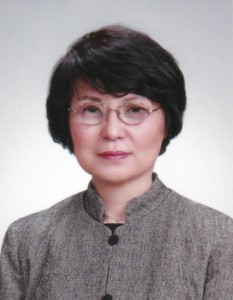 |
Yuri OKIMOTO
Dr. Yuri Okimoto graduated from the School of Medicine of Chiba University in 1975 and joined the Department of Pediatrics at Chiba University Hospital. In 1982, so as to become involved in treating hemophilia, she set up ‘Blood Group’ with Dr. Takeyuki SATO of the Infection Control Treatment (ICT) Department. When Chiba Children’s Hospital was opened in 1988 she was appointed Chief of the Hematology and Oncology Department. Since 2000 she has served as Head of this same department, a position she continues to hold to the present. Dr. Okimoto specializes in hematological malignancy. |
|
|
|
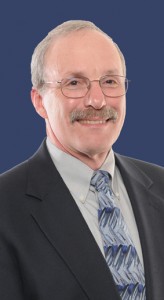 |
Phil ARKOW
Phil Arkow is an acclaimed lecturer, author and trainer who has conducted over 200 trainings internationally and authored more than 55 books, chapters and articles. He is Coordinator of the National Link Coalition which serves as the National Resource Center on The Link between Animal Abuse and Human Violence. He also chairs the Latham Foundation’s Animal Abuse and Family Violence Prevention Project. He is a consultant to the ASPCA and the Animals & Society Institute.
He co-founded the National Link Coalition, the National Animal Control Association, the Animal Welfare Federation of New Jersey, and the Colorado Federation of Animal Welfare Agencies. He teaches Certificate courses in Animal-Assisted Therapy at Harcum College and Camden County College.
A former newspaper reporter and foundation communications officer, Arkow is a prolific authority on the human-animal bond, violence prevention, humane education, animal-assisted therapy, and animal shelter management. He has served on boards and committees with the American Veterinary Medical Association, the Delta Society (Pet Partners), the American Humane Association, and the American Association of Human-Animal Bond Veterinarians. |
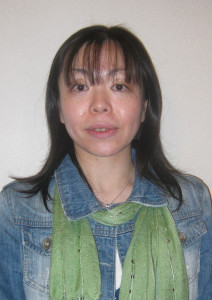 |
Sakiko
She received her B.A. from the College of Liberal Arts of International Christian University. She received her M.A. and Ph.D. in Social Welfare Studies from the Graduate School of Japan College of Social Work. |
|
|
|
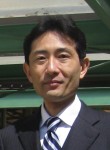 |
Dr. Tahara is a veterinarian and a graduate from Osaka Prefecture University’s Department of Veterinary Medicine, School of Agriculture (1996) after which he joined Amagasaki City Office (Hyogo Prefecture, Japan) in 1997. He has been in charge of rabies prevention, animal care and control work for Amagasaki ever since. From 2010 (and currently), he has held the position of Chief Clerk for Animal Care in the Health Preservation Division of the Amagasaki City Health Welfare Department. |
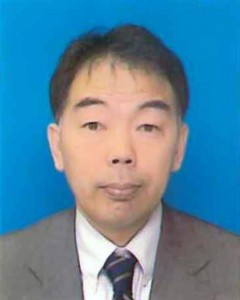 |
Ryoji NISHIZAWA
Ryoji Nishizawa was born in 1959 in Kobe. In 1981 he graduated from Kwansei Gakuin University’s School of Sociology. Since 1993 he has been involved in the publishing of mail-order information and a magazine for pet owners. He is responsible for interviewing and writing about animal hospitals and the key individuals working in veterinary medicine, self-governing bodies and pet related companies. He also edits the magazine. He has served as Secretary-General for the Japan Association for Promoting Harmonization Between People and Pets since its foundation in 2007.
|
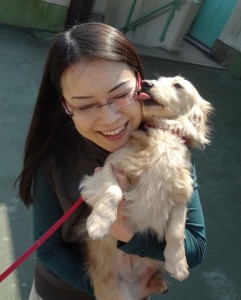 |
Veterinari
In 1994 Dr. Yuki graduated from the Department of Veterinary Sciences, Faculty of Agriculture, University of Miyazaki. She joined Kobe City Office Government in charge of rabies control, animal welfare and management at public health centers. In 2007 she was Assistant Manager at the Kobe Animal Control Center, and assumed her current post in 2012. |
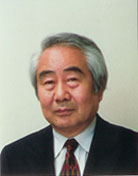 |
Tomoyuki OGATA
Having graduated from Waseda University, Tomoyuki Ogata became Chief Editor of ‘Sales Revolution’ for 14 years. He then served as Executive Managing Editor of five industry magazines as well being Chief Editor of the trade publication ‘Shogyo-kai’ (‘The World of Commerce’). After going independent, in 1983 he launched the monthly magazine ‘2020 VALUE CREATOR’, which has now been published for over 30 years, and where he is the current Chief Editor. He is one of very few specialist journalists that has been active for 50 years.
In his home town of Oita he has also been headmaster of a business tutorial school for 27 years (the Honorary Master being the prefectural governor). Through all these enterprises he has had a big impact on nurturing the young and the next generation of people responsible for business and trade. He has written 52 books, his most recent major title being ‘Why Only Seven Eleven Keeps Winning?’ |
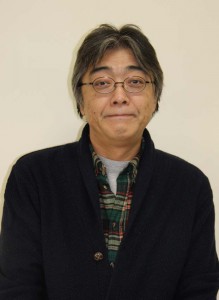 |
Takeshi SHIMANO
1986: Graduated from the University of Tokyo, Faculty of Law 1993: Group Director, Environmental Protection and Industrial Bureau 1994: Group Director, Consumer Goods Industries Bureau 1995: Resident, The University of British Columbia, Canada (omitted) 1999: Chief, (former) Ministry of International Trade and Industry, Consumer Goods Industries Bureau 2001: Planning Director, Cabinet Office, Atomic Energy Commission Secretariat 2002: Chief, Ministry of Economy, Trade and Industry, Manufacturing Industries Bureau, Bio-Industry Division, Bio-Business Promotion Office 2004: Professor, Faculty of Economics, Nagasaki University (in charge of Small and Medium-sized Enterprise Theory) 2007: Deputy Director, Nagasaki University, Center for Industry, University and Government Cooperation / Professor, Intellectual Property Division 2011: Deputy Director General / Professor Nagasaki University, Center for Industry, University and Government Cooperation (Education and Training Development)
At the University, Mr. Shimano is in charge of Modern Economic Theory and Small and Medium-sized Enterprise Theory. His seminar students have won awards under the business section of the Venture Grand Prix National Competition, as well as Ministry of Economy, Trade and Industry Awards (a first for Kyushu in a national grand prix). Mr. Shimano is also an advisor to Nagasaki Prefecture Industry Promotion Foundation and has won top accolades in a Nagasaki community-making project, as assessed by an external panel of judges. He has also been invited to be a lecturer for the Managers Education and Training Seminars held by Nagasaki Prefecture Industry and Labor Department. |
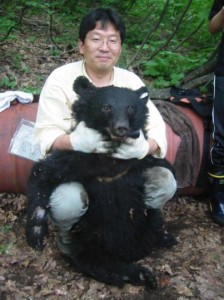 |
Toshio TSUBOTA
|
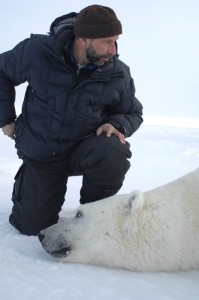 |
Andrew E. DEROCHER, Ph.D.
Dr. Andrew E. Derocher is a Professor of Biological Sciences at the University of Alberta in Edmonton, Canada. He holds a B.S. in Forest Biology (Hon.) from the University of British Columbia and a M.Sc. and Ph.D. in Zoology from the University of Alberta. He is a member and past chair of IUCN/SSC Polar Bear Specialist Group. His field research has studied polar bears in the Canadian Arctic, western Russia, and Svalbard over the past 30 years. Dr. Derocher has over 100 peer reviewed papers on the limiting and regulating factors of polar bear populations, habitat use, effects of harvest, behaviour, predator-prey relationships, ecotoxicology, and the effects of climate change. He is the author of Polar Bears: A Complete Guide to their Biology and Behavior published in 2012 by Johns Hopkins University Press and in 2014 by the University of Tokyo Press. |
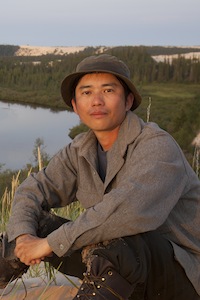 |
Hidehiro OTAKE
Born in 1975. Otake graduated with a degree in sociology from Hitotsubashi University in Tokyo, Japan. Since 1999, his main field of photography has become the boreal forest of North America called “the Northwoods”. Main themes are the significance and diversity of the wilderness including wildlife and landscape. Otake is also pursuing several projects about traditional culture connected to the landscapes such as First Nation culture, canoe trips, and winter snowshoeing. Otake’s photographs and s |
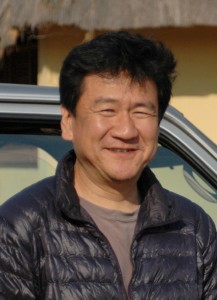 |
Koji YAMAZAKI
Born in 1961 Koji Yamazaki has an agriculture doctorate from the School of Agricultural and Life Sciences of Tokyo University of Agriculture and Technology. He has worked as a wildlife biologist at the Administrative Bureau for Zambia National Park. Then, after working as a curator for the Takao Museum of Natural History in Tokyo, he assumed his current post in 1995. His field of expertise and biology research is mammalian ecology and, since 1991, he has been investigating the ecology of Asian black bears (moon bears) in Okutama and the mountain areas of Nikko Ashio. He is a member of the Special Committee for Bears at the IUCN (International Union for Conservation of Nature and Natural Resources) and a representative and delegate for the Mammal Society of Japan. His publications include ‘Mori no yasei-dobutsu ni manabu 101 no hinto’ (101 things to learn from wild animals in the woods) (Tokyo Shoseki Co. Ltd.), ‘Sekai no kuma no seitai’ (Ecology of world bears) (Showado), ‘The Wild Mammals of Japan’ (Shoukadoh), and ‘Higuma to Tsukinowagima no Seitaigaku’ (An Ecological Study of Brown Bears and Asian Black Bears) (University of Tokyo Press) |
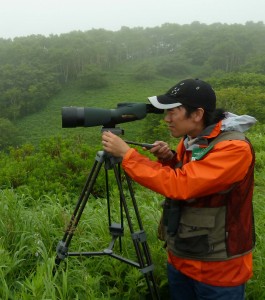 |
Daisuke FUKUI
Official posts: Chairman of the Commission on Countermeasures for Infectious Diseases of Japanese Society of Zoo and Wildlife Medicine, member of the Wildlife Measures Committee of the Japan Veterinary Medical Association Specialty fields: Zoo and wildlife medicine, Relationship and conflicts between human and wildlife Background and Posts: 1973: Born in Shiga Prefecture. 1998: Graduated from the School of Veterinary Medicine of Hokkaido University 1999-2012: Previously worked as a zoo veterinarian and curator (2009-2012) at Asahiyama Zoo in Asahimawa for 13 years during which time he devoted himself to activities for connecting ‘zoos and nature’ and ‘humans and nature’. Also worked for 8 years as a species coordinator of Polar bears (Ursus maritimus) of the Japanese Association of Zoos and Aquariums, actively managing the pedigree registrations and breeding projects conducted in efforts to preserve the species. 2013-: EnVision Conservation Office Hobbies: revolve around his appreciation of nature and include forest, mountain, river path and coastal walking as well as kayaking and spending time with his pets.</ span> Lifework: Started working as a Field vet. Has come to recognize the preciousness of nature and all the living creatures which have nurtured him. Guided by the aims of ‘One World, One Health’ he is now tackling the challenges for wildlife management and conservation with even greater enthusiasm. |
|
|
|
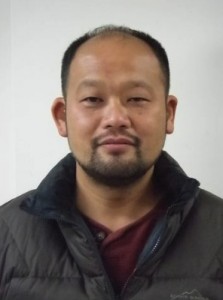 |
Yusuke EGUCHI
Career Study field: Ethology, Wildlife Management, Applied animal Science |
|
|
|
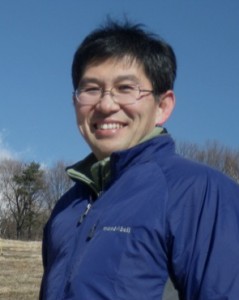 |
Hidearu TSUKADA
Career
Study field: Wildlife Management, Ethology |
|
|
|
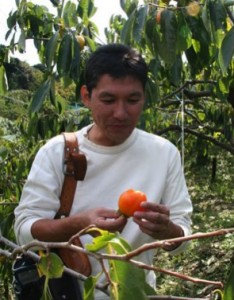 |
Hironori UEDA
2001 – 2002: Researcher, Yamanashi Institute of Environmental Sciences
Study field: Ecology, Ethology
|
|
|
|
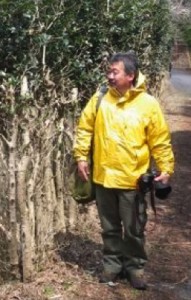 |
Masuo FURUYA
Study field: Wildlife Management |
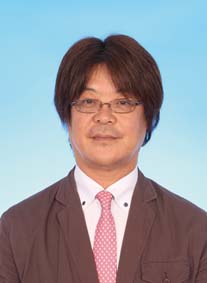
|
Taisei HOSOIDO
1955, Dec:Born 1979, Mar:Graduated from Department of Veterinary Medicine, Faculty of Agriculture, Yamaguchi University (Obtained veterinarian qualification, June 1979, No.18514) 1989, June:Opened Hosoido Animal Hospital (Tsurumi-ku, Osaka City) 2005, Sept:Opened Tsurumi Ryokuchi Animal Hospital 2005, Oct:Opened Neovets VR Center (consultant) in Osaka Opened Pet Clinic Sumiyoshi-Taisha Minami 2007, Feb:Hosoido Animal Hospital Ltd. (later became ‘VR ENGINE Co.’) 2005, Jan:Member of Study Group on Small Animal Veterinary Medicine, Ministry of Agriculture, Forestry & Fisheries 2007, Aug: Member of Study Group on Securing Pet Food Safety, ditto</spa n> 2008, Aug:Specialist member of Agricultural Materials Council, ditto 2008, Aug ~ present: Specialist member of Central Environment Council, Ministry of Environment 2008, Aug ~ present: Member of Veterinary Medical Affairs Council 2008, April ~ present: Specialist member of University Chartering and Incorporated Educational Institutions Council, Ministry of Education, Culture, Sports, Science & Technology. 2010, Aug: Section Chairperson, Veterinary Medical Affairs Council, Licensing Section, Ministry of Agriculture, Forestry & Fisheries. |
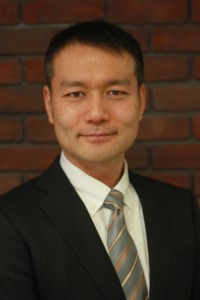 |
Koichi FUJII D.V.M., MS, Ph.D, MBA
1962 Born in Yokohama City |
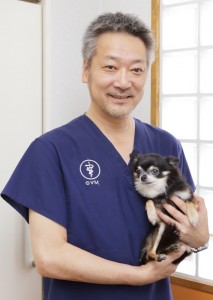 |
Yoshihisa HONDA
In 1984 Dr. Honda completed his Master’s course at Nippon Veterinary and Animal Husbandry University (now the Nippon Veterinary and Life Science University). Two years later he opened ‘Mew Animal Hospital’ in the Yodogawa ward of Osaka City. In 1998, as a Director of Neovets, he became involved in launching Japan’s first night time emergency hospital, and in 2007 with founding the Neovets VR Center. |
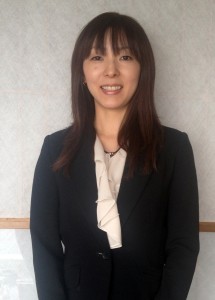 |
Ryoko TOMINAGA
Ms. Tominaga was born in Yamaguchi Prefecture and graduated from Osaka Peppy Animal Nursing College before working at Tsurumiryokuchi Animal Hospital. In 2007 she joined the newly opened Neovets Veterinary Referral Center where she has been actively contributing to the improvement of patient care through a 24 hour nursing system.
Ms. Tominaga also serves at the Japanese Veterinary Nursing Association, an organization for professional animal nurses, where she is making efforts to have veterinary nursing established as an official qualification. She herself is a certified animal nurse, JAHA certified, and holds a CAPP partners qualification. She currently lives with her 11 year old maltese and 9 year old cat. She has now been a veterinary nurse for 15 years. |
|
|
|
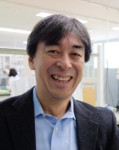 |
Tsutomu SEKIZAKI
Educational and Professional Background:
Members of Academic Societies:
Main Research Area: |
 |
Ro OSAWA
Educational and Professional Background:
Members of Academic Societies:
Main Research Area: |
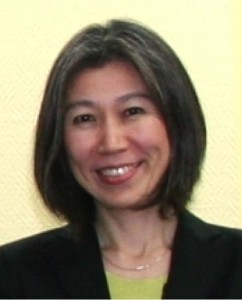 |
Tomoko ISHIBASHI
Upon qualification as a veterinarian, Dr. Tomoko Ishibashi joined Japan’s Ministry of Agriculture, Forestry and Fisheries, where her experience has ranged from domestic animal health policy to trade negotiations for agricultural products, including development and implementation of a tagging program and computer database to track the movement of all cattle nationwide, which became an urgent MAFF priority upon the discovery of BSE cases in 2001. Following several years’ work at OIE Headquarters in Paris, Dr. Ishibashi has been Deputy Representative of OIE Regional Representation for Asia and the Pacific since 2010. In this position, she has been representing the OIE at meetings and conferences in the region aimed at improving animal health and welfare. |
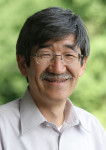 |
Shusuke SATO
Academic background and Career
Main written books (in Japanese) |
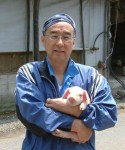 |
Yuzo KOKETSU, BVSc, MVSc, PhD
EDUCATION
EMPLOYMENT RECORD
Through research, teaching and extension service, I would like to contribute my efforts and time |
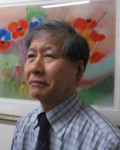 |
Kozi TAKASE, DVM
Dr. Takase was born in 1952 in Oita Prefecture, Japan. In 1975 he graduated from the School of Veterinary Medicine at the Faculty of Agriculture, Kagoshima University and in 1977 completed his post-graduate studies. In that same year he joined the Chemo-Sero-Therapeutic Research Institute.
In 2000 he became an Assistant Professor and then, in 2003, a Professor at the Faculty of Agriculture, Kagoshima University. He has held his current post since 2012 serving also as Faculty Dean between 2012~2013. He is a trustee of the Japan Society of Veterinary Science, Chair of the society’s Poultry Diseases Division, and an editorial member for the Journal of the Japanese Society on Poultry Diseases (J.Jpn. Soc. Poult. Dis.). His specialty field is poultry disease studies, for which he has carried out research into pathogens and preventions. He has also investigated causes of death within migratory birds (cranes). |
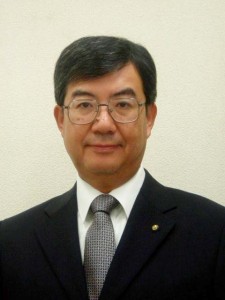 |
Veterinarian / Director, Hyogo Prefecture Meat Hygiene Inspection Center
1955 Born in Hyogo 1978 Graduated Faculty of Veterinary Medicine, Hokkaido University Hyogo Prefecture Toyooka Health Center 1984 Food Sanitation Section, Health & Environment Dept., Hyogo Prefectural Gov’t 1989~2011 Hyogo Prefecture Tatsuno Health Center Meat Hygiene Inspection Center Life Hygiene Section, Health & Welfare Department Health & Welfare Office and others. 2012 Secretary of the Consumer Living Department and Manager of the Life Hygiene Section, Health and Welfare Department of Hyogo Prefecture 2013 Secretary and Advisor to the Consumer Living Department and Manager of the Life Hygiene Section, Health and Welfare Department of Hyogo Prefecture 2014 Director, Hyogo Prefecture Meat Hygiene Inspection Center
Positions 2005~2009 Chairperson, Hyogo Prefecture Public Health Veterinarian Association 2006~2010 Executive Director, Veterinary Association of Hyogo Prefecture 2013 Investigator, Food Traceability Promotion Entrustment Committee |
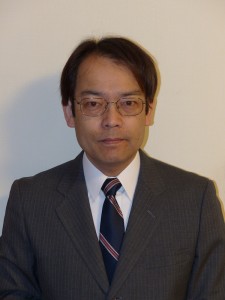 |
An associate professor of psychology at Nara Women’s University, and a member of the Japanese Psychological Association.
Amagase Masahiro completed human behavioral science course at Graduate School of Literature and Human Sciences, Osaka City University. He studies environmental cognition and behaviors, and the psychological basis of ethics as our way of living. He chairs the meeting for promoting moral education at Nara since 2012, and the conference for the study of “Inochi” education at Nara Prefecture Uda Animal Park since 2013. |
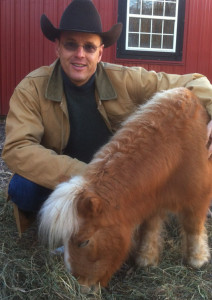 |
Michael E. KAUFMANN
Michael Kaufmann has been involved in Human/animal Interaction Programs, Animal Welfare and in Humane Education for 30 years. He directs the Sam and Myra Ross Institute at Green Chimneys, a program dedicated to education and research on the human connection to animals and the natural world. Kaufmann started his career as a humane educator at the American Society for the Prevention of Cruelty to Animals (ASPCA) in New York City and continued at the American Humane Association (AHA). Subsequently he represented the North American Riding for the Handicapped Association (NARHA) as Director of Education and Communication. Today his focus is on Green Care, the concept of working with animals, plants and nature to enhance human environments and lives. Michael served as a consultant to the Denver University Graduate School of Social Work Institute for Human and Animal Connection, chaired the Humane Education Advisory Council of the Latham Foundation, was an advisor to the Delta Society and participated on the Harrison Memorial Veterinary Hospital advisory board. |
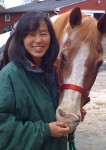 |
Miyako KINOSHITA
Miyako Kinoshita is the current Farm Education Program Manager at the Green Chimneys Farm and Wildlife Center and Sam and Myra Ross Institute at Green Chimneys. She serves as the key facilitator for over 200 children with psycho social disabilities currently in residence and day school and facilitates and co-supervises a wide range of animal and plant based nature assisted programs. She is the liaison to the social work department, child care, the teaching staff and advocates for the positive impacts of the farm environment and connects children and nature.
Miyako is the former president of the Equine Facilitated Mental Health Association (EFMHA) and is a current board member of the Professional Association of Therapeutic Horsemanship International (PATH) serving as a secretary. As a noted speaker on the incorporation of nature based programs in a residential treatment and school setting, Miyako has lectured extensively in the United States and internationally at various conferences. Her lecture have taken her to State University of New York at New Paltz, University of Denver, Azabu university, Teikyo university of Science and Technology, among others and appeared in multiple media productions in the United States and in Japan. |
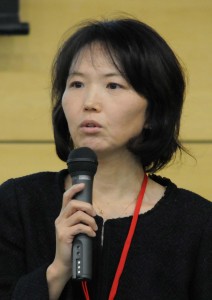 |
Veterinarian / Assistant Manager at Nara Prefecture Katsuragi Health Center
Dr. Fujii completed her post-graduate veterinary medicine course at Kitasato University, Japan in 1988 and joined Nara Prefectural Government Office. From 1992, she worked at a health center in charge of rabies prevention, animal care and control, etc. From 2012 she worked at an animal care center, and since 2014 at the Nara Prefecture Uda Animal Park Promotion Office, before taking up her current Katsuragi Health Center post. |
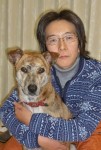 |
Sumie KODERA
Dr. Kodera graduated from Kitasato University’s School of Veterinary Medicine and Animal Science in 2000 and, in the same year, joined Wakayama Prefectural Government Office. During her time working for Wakayama Prefecture Animal Welfare Center it was Dr. Kodera who proposed the ‘WAW Class’, animal welfare class, an educational program aimed at elementary school children. She later worked in the Food, Public Health and Sanitation Division of the Prefectural Government, and for Gobo Health Center. She assumed her current post at the Animal Welfare Center in 2010. |

